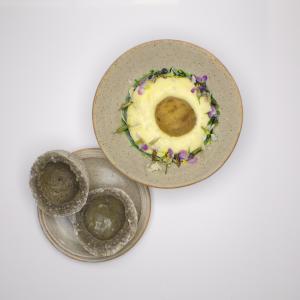 Kobe Desramaults of In de Wulf is considered to be one of the brightest young chefs in Europe and definitely one of the most high-profile Belgian chefs. His Michelin star restaurant in Dranouter, a village in West Flanders on the border with France is in the middle of nowhere. There is a reason why it is there, however, since it is the place he remembers from his childhood and also where his mother’s restaurant was.
Kobe Desramaults of In de Wulf is considered to be one of the brightest young chefs in Europe and definitely one of the most high-profile Belgian chefs. His Michelin star restaurant in Dranouter, a village in West Flanders on the border with France is in the middle of nowhere. There is a reason why it is there, however, since it is the place he remembers from his childhood and also where his mother’s restaurant was.
The restaurant has become a major culinary destination. Desramaults won the best restaurant award in the OAD (Opinionated about dining) in 2014 and has become in a way similar to Noma in that this is a unique cuisine without cliches, classic produce or sauces.
Desramaults was the first chef to take the stage at Chef Sache 2o14 . He showed how his cuisine focuses on all sorts of produce and it was no wonder that the presenter spoke about Kobe’s cooking as being a light cuisine for a conscious eater prepared by a conscious cook.
The Belgian chef said that vegetables get priority in the kitchen depending on the seasons. “For example, in summer we use more vegetables in our cooking. The main focus is to do something simple but which brings out the best of every ingredient we use.”
His philosophy was to try and innovate with every product. “We need to be open minded and try to find different options. There is a whole world of discovery out there.” To give an example Kobe said that just because Escoffier had created over 50 ways of cooking a potato does not mean that innovation should stop there. “There is still room for innovation. We should always aim to do more and to try something new. That is why one of the favourite dishes in the restaurant is one made from one of the cheapest possible ingredients, the potato.”
The Belgian chef does not necessarily find inspiration from books though he says these are very important to inform oneself. “To be inspired you need to think and cook like a kid. You need to play around with food and experiment.”
Kobe is very progressive with his techniques and gives a lot of importance to local produce. He says people are being woken up to food scandals in supermarkets. “We know people want to make money but the scandals were a wakeup call. This is extremely important because we as consumers need to know what goes into our mouths. Everything must be more transparent. Everyone needs to know where food is coming from.
Kobe said that In de Wulf, they focus on the most humble produce that they can find. The first dish that he prepared was a potato. To make this dish special he cooks the potato in a salt crust dough. “This could easily be a dish which is prepared by children in the restaurant because it is similar to playing with play dough.”

The Belgian chef covered the potato with this dough which is made from ashes, salt, flour, oil and water. The potato is baked for 25 minutes in the oven. It is served with a buttermilk puree which he said was similar to what grandmothers would cook at home. “We add cheese to the buttermilk and we then finish the dish off with a green oil which is prepared from the waste of leek. In our restaurant we try to use everything so we mix the green part of the oil and then freeze it. We finish the dish off with radish, rucola flowers salt and horseradish. I never use pepper in my restaurant,” he said.

The second dish Kobe prepared was celeriac. He sliced the celeriac thinly and then blanched it for a few seconds before putting it in the oven at 70 degrees for a whole day. In this way he extracts all the water and concentrates the flavour. “We also get pure water from the celeriac which is passed through a cheesecloth and reduced to concentrate the flavour. We add butter and let it incorporate all the celeriac juice. The dish imitates the structure of pasta but it has a nice bite to it which is very strange. The only seasoning used is fresh wild celery lovage which is mixed with salt and dried for a few days.

The third dish he prepared was pork. He recalled how until two years ago he had never eaten pigs brain but he said that when he tried it for the first time at a friend’s grandmother and it was one of his best meals ever. “Drinking Duvel (a strong Belgian beer), with it must have helped.”
He says that they source the pork from a farm next to the restaurant. “We use all the pork and also cook the brains. This is part of the philosophy of the restaurant. We do not tell our guests what it is except after a few glasses of wine,” he joked. The skin from the head is confited and a salt cured lard is prepared. The butter is also made in the restaurant. They prepare the pork dish with a blood sausage. The tart with the pork brain is served on a pork head skeleton (see photos) which has become synonymous with the restaurant.
We interviewed Kobe Desramaults in Cologne. Read more about him, In de Wulf and his two ventures in Gent, De Vitrine and Superette, in a forthcoming post on www.foodandwinegazette.com

Leave a Reply